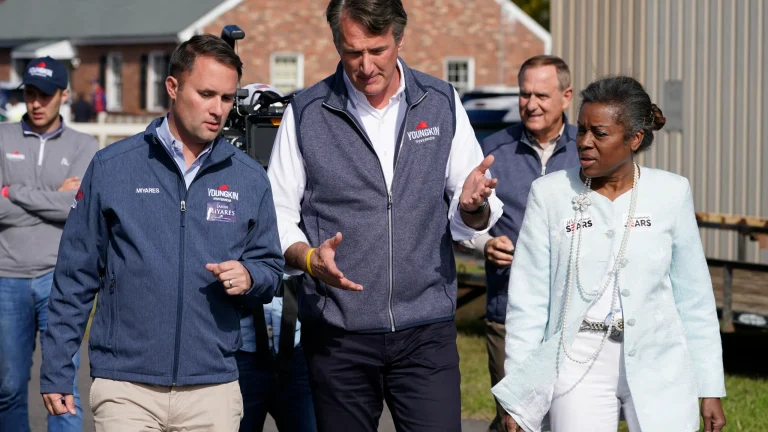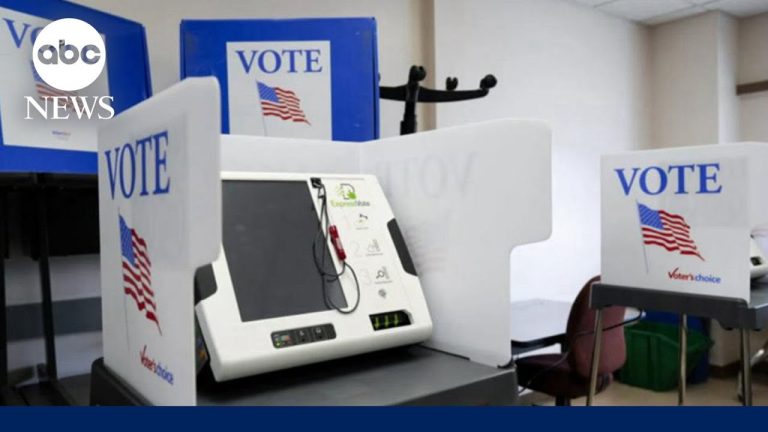“That’s why we’re losing elections,” one Republican field veteran said of the conservative canvassing apparatus. “Nobody wants to admit it.”
A few weeks before last fall’s midterm elections, a paid canvasser in Nevada did what thousands of door-knockers across the country were doing: They went on an app and marked off the homes they had visited that day.
There was just one problem. This canvasser never went anywhere near those homes in a neighborhood in south Las Vegas. They were 8 miles away, sitting inside Caesars Palace casino, according to geotracking data obtained by NBC News.
The canvasser was working for an outside group backing GOP Senate candidate Adam Laxalt, who was seeking to topple one of the most vulnerable Democratic incumbents of the 2022 cycle. The canvasser was fired soon after the incident, according to two Republicans who worked on the canvassing effort.
If this were an isolated episode, it’d be a minor nuisance. But it wasn’t.
The large-scale voter contact effort that conservatives have put at the center of their political operations in recent years is plagued with issues, according to more than a dozen people who’ve worked in GOP-aligned field operations and internal data obtained by NBC News. Those issues include fraudulent and untrustworthy data entries, akin to what occurred in Nevada, as well as allegations of lax hiring practices and a lack of accountability.
Issues with canvassing arose in two of the closest losses of the 2022 election, four people familiar with those operations said. They were Nevada, where Laxalt’s narrow loss allowed Democrats to keep control of the Senate, and Georgia, where the GOP nominee for Senate, Herschel Walker, was ultimately defeated in a runoff election.
A half-dozen Republican-aligned field operators working on various races in Nevada, Georgia and Oregon said they encountered suspicious or fraudulent data — such as entries filed from homes that weren’t visited or falsified surveys — in 2022.
That’s just three states. But these individuals say those problems, as well as allegations raised in a recent lawsuit against one of the largest vendors in the conservative canvassing business, should raise internal alarms. These field operators said they’ve harbored similar concerns for multiple cycles but only provided documentation for the most recent midterms.
The problems, six people said, are pitfalls of the right’s increased reliance on paid canvassers rather than volunteers, and on a sprawling web of vendors and consultants tasked with what can be a thankless, though critical, job. Seven people said that cheating is on the rise amid pressure to quickly meet steep outreach goals.
After several cycles of tough, sometimes close, losses, the concerned operatives said they believe it’s time for party leaders to address what they say is happening on the ground.
“That’s why we’re losing elections,” one Republican field veteran said of the conservative canvassing apparatus. “Nobody wants to admit it.”
This report is based on interviews with more than 20 Republicans who have experience in canvassing operations, including operatives who have worked at the top levels of the RNC and overseen large-scale field operations, mid-level managers, and canvassers who travel the country picking up work. Most expressed concerns. NBC News also obtained and reviewed internal campaign data that appeared questionable, including geotracking information showing canvassers filing far from the homes they claimed to have visited. Most Republicans who spoke with NBC News did so on the condition of anonymity out of fear of retribution or because they were not authorized to speak publicly.
Donors have been eager to open their wallets for this type of work, and campaign finance records show canvassing is a multimillion-dollar business. Just how effective those dollars are is questionable, sources said, with some warning the consequences of incorrect data could be significant.
“Because these numbers are recycled, they’re used in text messages, they’re used in mailers, they’re used to target voters,” said one GOP field operative who has worked on multiple party-aligned canvassing efforts. “And if the base data is bad, it’s a disaster for campaigns everywhere.”
Cheaters do sometimes get caught. Even so, cheating can be a drain on resources during the final push of a campaign, requiring work to have to be redone. At the last minute, new canvassers must be hired and trained from a smaller pool of available workers.
One national GOP operative who’s overseen door-knocking campaigns estimated that in their experience “when it comes down to the actual cheating,” roughly “10 to 20% of the staff ends up getting fired.”
GOP leaders have blamed a variety of factors for disappointing midterm elections despite narrowly gaining control of the House of Representatives: The dominance of abortion rights as an issue after the Supreme Court overturned Roe v. Wade last year; flawed candidates; the strength Democrats have shown with early voting and other get-out-the-vote methods. Many in the party have pointed the finger at former President Donald Trump, who in critical swing state races boosted fringe candidates who echoed his stolen election lies as well as his attacks on early voting.
The Republican National Committee is formally reviewing why the party fell short of expectations. Officials overseeing the national party’s post-midterm audit did not respond to questions from NBC News on whether they are reviewing canvassing operations as part of that effort. NBC News reported in April that the party is unlikely to make public any findings of that analysis.
Presented with the findings of this report, the RNC said multiple staffers were fired last cycle for entering fraudulent data and detailed steps it takes to ensure its door-knocks are legitimate, including geotracking and in-person oversight of canvassers who are flagged for submitting suspicious entries.
Though Democrats deal with some of the same door-knocking challenges, the party has built-in advantages for in-person canvassing, according to interviews with two Democratic canvassing veterans as well as with Republicans with similar experience. They include a more ready supply of younger volunteers, allies in organized labor offering union workers to hit the doors and a base of supporters who are more tightly concentrated in urban and dense suburban areas where canvassers can hit a lot more doors in a lot less time.
While many of the Republicans who spoke with NBC News said there was cause for real concern, others suggested the problems were more limited in scope, with some pointing to places like Texas and Florida where operations for two high-profile governors (both of whom were easily re-elected) appeared to work smoothly.
One former top RNC field official cautioned that the people sounding the alarm, particularly about any type of widespread cheating, were trying to capitalize on the party’s midterm shortcomings.
“I don’t think everything was done perfectly, obviously, [look at the] results,” this person said. “But at the same time, there are a lot of people that have their own agenda or some other agenda for outside groups or whatever the case may be.”
A paper trail
Every Republican interviewed by NBC News said that door-knocking, when done correctly, is one of the most effective ways to reach voters.
Campaigns use door-knockers — volunteers or hired hands who go out to rally supporters to the polls and collect survey data, sometimes referred to as a candidate’s ground game — to gather direct data and juice voter turnout. After the 2012 election, an academic study found that the presidential campaigns increased turnout by roughly 7% in areas they had canvassed heavily.
Canvassers once went around with clipboards and paper, checking off houses along the way. Now, canvassers are largely expected to tick off doors in real time via smartphone apps equipped with geotracking, a core fraud-prevention capability. Canvassing experts say there are some valid reasons to still use paper on a small scale, but those types of entries make it more difficult to ensure that a canvasser was physically knocking on a door.
A high volume of paper, these experts said, would be cause for concern — as appears to be the case last year in Georgia’s general election.
Two field staffers who worked for Georgia Victory, a ground-game operation jointly overseen by the RNC and the state Republican Party, said that as November neared, they became increasingly alarmed by the unusually high volume of paper entries. The operation used the app Campaign Sidekick, a Republican-aligned data platform that includes geotracking technology.
The number of paper entries in Campaign Sidekick grew from zero during the early months of the door-knocking effort to more than 1 million by late October, internal data from mid-April to late October obtained by NBC News showed. A national GOP operative disputed this figure, saying paper door contacts accounted for just over 860,000 entries last cycle.
Georgia Victory divided the state into 12 regions. Nine of those regions went from having zero paper entries early in the canvassing cycle to having paper entries account for anywhere from 25% to 92% of total weekly app submissions in the campaign’s closing weeks, according to the data.
“There’s only two ways to actually verify doors,” one of the Georgia Victory staffers said. “When you use the app, it has a geolocation and a timestamp attached to a user profile. The way to make them unverifiable is you get rid of the geolocation or you get rid of the user profile. And there’s no way to actually trace anything back to anybody whatsoever.”
“There’s plausible deniability across the board,” the staffer said.
The issues could have played a role in Walker being forced into a runoff, according to an NBC News review of the data, though the candidate, a political newcomer beset by scandal, was viewed as flawed.
In five regions that saw a significant number of paper submissions, Gov. Brian Kemp ultimately earned more than 65,000 additional votes than Walker, a fellow Republican. These were the voters who cast ballots for one of the two Republicans at the top of the ticket, but who might have been convinced to vote for both with the appropriate pitch.
In these deep-red regions, nearly 670,000 of the roughly 1.54 million door-based contacts from early July through late October were submitted as paper, according to the data NBC News obtained. (A senior Walker campaign official praised the relationship the campaign had with Georgia Victory and said the candidate “lost for a variety of reasons most people in America unfortunately know, none of which included the lack of doors knocked.”)
The two staffers both said they did not personally raise their concerns about the paper entries with superiors.
In a statement, Ryan Caudelle, executive director of the Georgia GOP, said: “The vast majority of our door knocks were recorded on cell phone apps.”
“We checked and double checked this data, matching the geolocation of the entered data to the street address,” he added. “Paper walk books were only used in areas with spotty cell coverage or with volunteers who did not have phones capable of using the apps.”
Just because an entry was submitted on paper does not make it fraudulent. Occasionally, volunteers, particularly those who are older, will ask to use paper logs because they don’t feel comfortable with an app. GOP field operatives say they work to help such volunteers adapt to the technology.
Additionally, two people familiar with the RNC’s canvassing operation said GOP candidates may upload their data into party-led operations like Georgia Victory, boosting the party’s topline number but potentially skewing paper entries in the process.
But multiple Republicans familiar with canvassing said there would be no reasonable explanation for using so much paper. As many as 10% to 15% of the entries may reasonably be expected to come in as paper, the national GOP operative said. Any more — as was the case in most Georgia Victory canvassing regions — would be cause for concern, this person said.
“Paper doesn’t count,” this person said, explaining what they tell volunteers who want to do paper-based canvassing.
(Another major conservative canvassing effort, run by Turning Point Action, canvassed entirely on paper in 2022, two sources said. But that won’t be the case for 2024. In response to questions from NBC News, a Turning Point spokesperson said it recently launched its own canvassing app, but did not elaborate.)
Responding to questions about NBC News’ Georgia findings, RNC spokesperson Keith Schipper said in a statement: “Because of the RNC’s data-driven ground game, Republicans won 8 out of 9 statewide races in Georgia, and we will always defend our world class volunteers against anonymous and baseless attacks.”
“The vast majority of volunteers in our program use our walk applications over paper to knock doors and we have controls in place to ensure accountability,” he added.
The influx of paper entries in Georgia coincided with an increase in door-knocking goals from the RNC, according to one of the staffers and corroborated by the data NBC News obtained. Regions that used paper consistently hit the new goals, almost to the exact target, while regions with no paper submissions often didn’t, the data showed. Some of the totals were “physically impossible” to pull off, the staffer said.
Georgia field operatives and Republicans who’ve worked elsewhere said the maximum number of actual doors a canvasser could reasonably be expected to hit in a day is somewhere from 200 to 250, which breaks down to roughly one door hit every two minutes over an eight-hour shift.
But there are variables at play — including the density of a neighborhood or region. The RNC counts every voting-age member of a household as an individual “door.”











